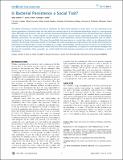Is bacterial persistence a social trait?
Abstract
The ability of bacteria to evolve resistance to antibiotics has been much reported in recent years. It is less well-known that within populations of bacteria there are cells which are resistant due to a non-inherited phenotypic switch to a slow-growing state. Although such 'persister' cells are receiving increasing attention, the evolutionary forces involved have been relatively ignored. Persistence has a direct benefit to cells because it allows survival during catastrophes-a form of bet-hedging. However, persistence can also provide an indirect benefit to other individuals, because the reduced growth rate can reduce competition for limiting resources. This raises the possibility that persistence is a social trait, which can be influenced by kin selection. We develop a theoretical model to investigate the social consequences of persistence. We predict that selection for persistence is increased when: (a) cells are related (e. g. a single, clonal lineage); and (b) resources are scarce. Our model allows us to predict how the level of persistence should vary with time, across populations, in response to intervention strategies and the level of competition. More generally, our results clarify the links between persistence and other bet-hedging or social behaviours.
Citation
Gardner , A , West , S A & Griffin , A S 2007 , ' Is bacterial persistence a social trait? ' , PLoS One , vol. 2 , no. 8 , e752 . https://doi.org/10.1371/journal.pone.0000752
Publication
PLoS One
Status
Peer reviewed
ISSN
1932-6203Type
Journal article
Description
All three authors are supported by Royal Society fellowships.Collections
Items in the St Andrews Research Repository are protected by copyright, with all rights reserved, unless otherwise indicated.

